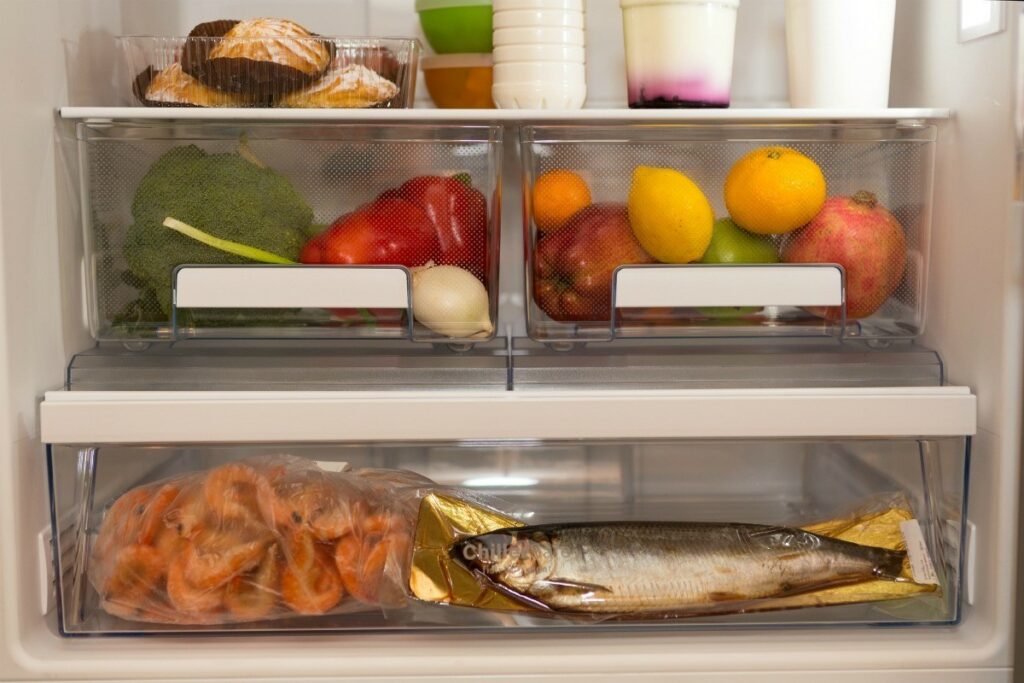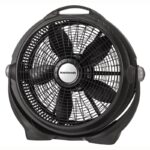Fridge Odors, Although many people enjoy eating fish, a fishy odor in the refrigerator is unpleasant and can taint other meals. As a result, in this article, we’ll explain what causes that fishy odor in your fridge and how to get rid of it.
Table of Contents
Why Does My Fridge Smell Like Fish?

If your fridge has a strong fishy odor, it could be a sign of various problems. Problems with the fan, a burned start-up relay and overload sensor, and a failing compressor in your refrigerator are examples of such issues. These problems could result in a small amount of stagnant moisture accumulating and emitting a fishy odor.
How Do You Get Rid of a Fishy Smell in Your Refrigerator?
The secret to removing a fishy odor from a refrigerator is to empty it, clean it thoroughly, and apply items that absorb lingering odors. However, preventing fish odors is always the simplest solution, and you can do so by tightly sealing all containers and bags, as well as using your products before they go bad. Here’s a quick rundown of how to get rid of that fishy odor in your refrigerator.
Empty Your Refrigerator
Begin by emptying the fridge and freezer of all food. When the refrigerator is empty, it is simpler to clean it thoroughly. It’s also crucial to clean the freezer because the fridge and freezer share the same air, which means the fish odor could have spread to the freezer as well. You can use the following methods to keep your meals fresh while you work:
- If it’s chilly enough, leave it outside
- Put it in a cooler with ice packs to keep it cold
- Transfer it to a neighbour’s refrigerator
Throw out any contaminated or rotting food. Locate the source of the fishy odor and throw it out to ensure that the fish smell, or any other unpleasant odor, does not return after your fridge has been cleaned. Throw out any food that has gone bad, moldy, or rotten while you’re at it.
Next, smell all the other foods in the fridge for any traces of fish smell. Fridge Odors possible that objects that weren’t properly sealed and stored picked up the stink. Throw out everything that has a fishy odor
Unplug your fridge from the power source
To get rid of a fish odor in a refrigerator, you’ll need to conduct some significant cleaning and airing out, and you don’t want to waste any electricity doing so. Once all of your food is out of the fridge, the best approach to save electricity is to unplug your refrigerator. After turning your fridge off, ensure the doors are left open until it has fully defrosted, or mold may develop.
Remove all of your refrigerator’s drawers, racks, and shelves. Fish odors could have pervaded the entire fridge, and cleaning every surface is the best method to get rid of them. Refrigerator drawers, racks, and shelves are all removable, and cleaning them will be a lot easier once they’re out of the fridge. Place these items on the counter or on top of the refrigerator to keep them out of the way until you’re ready to deal with them; try to stay organized by separating the ones you’ve cleaned by putting them back in your fridge.
Cleaning Your Refrigerator
Use soap and water to clean your refrigerator. Add five drops of liquid detergent to a bucket of hot water. Using a clean cloth, use the soap and water solution to clean every inch of the interior surface of your fridge and freezer. As you clean, re-soak and wring the cloth regularly. Fill a bucket with ordinary water after you’re done. Using a clean cloth, wipe out the interior surfaces of your fridge with clean water.
Make a disinfectant cleaning solution. You can combine in a bucket depending on what you have on hand at home:
- Four liters of water plus half a cup of bleach
- Water and white vinegar in equal portions
- Baking soda and an adequate amount of water to make a paste.
Disinfect the insides of your refrigerator and freezer. Wipe the inside of the fridge and freezer using a clean cloth dipped into the cleaning solution. Wipe off the shelving, trays, bottom, top, sides, and other surfaces of your refrigerator as well. The surfaces with clean water to remove any excess cleaner once you’re done.
Dry the surface of your refrigerator with a dry towel. This will aid in the prevention of water spots inside the fridge and speed up the air-drying process.
Air out your refrigerator and freezer. After cleaning your fridge and freezer thoroughly, let them air dry for at least 2 hours.
Clean and disinfect the shelves, drawers, and racks. Follow the steps you did with the rest of your fridge to achieve this.
Absorbing Excess Odors
Assemble and Plugin Your Refrigerator. Return the shelves, drawers, and racks to their original positions after your refrigerator and freezer have had enough time to air out. Reconnect the appliance and allow it to cool.
Odor-absorbing products should be kept in the refrigerator and freezer. The odor-absorbing materials will aid in the removal of any remaining traces of fish odor. You can use the following as odor absorber:
- Two bowls loaded with fresh coffee ground
- Baking soda sprinkled on plates
- Newspaper sheets crumpled and put into the refrigerator and freezer’s open places
Return your cold foods and beverages to the refrigerator or freezer. After 24 hours, you can take your odor-absorbing items out of the fridge and put your food and drinks back in.
How Do You Prevent Future Fishy Smells?

One of the most important ways to keep your fridge clean and odor-free is to clean spills as soon as possible. You can also use foods before they spoil and toss them out as soon as they begin to rot. Another critical factor in preventing fridge odors is proper food storage. Here are some pointers on how to properly store your food:
- Open foods should be placed in sealable bags or airtight containers.
- Leftovers should be stored in airtight containers.
- Before storing freezer bags and other bags, ensure they are correctly sealed.
- Ensure that all lids are firmly attached.


